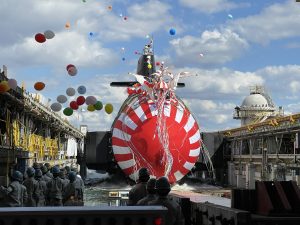The cabinet of Japanese Prime Minister Kishida Fumio approved on November 26 773.8 billion yen ($6.7 billion) defense spending in the fiscal 2021 supplementary budget amid growing military threats from North Korea, China, and Russia.
Including U.S. Forces realignment-related expenses allocated for mitigating impacts on local communities, this marked a record figure for defense appropriations in history in an extra budget.
Combined with the nation’s highest-ever 5.34 trillion yen initial budget for fiscal 2021, started in April, the total defense budget for this fiscal year reached more than 6 trillion yen for the first time, hitting a record high for the seventh straight year and surpassing the long-standing cap of 1 percent of gross domestic product.
These budgets reflect Tokyo’s resolve “to bolster its own national defense capabilities to further strengthen the US-Japan alliance and regional security,” as pledged by then-Prime Minister Suga Yoshihide and U.S. President Joe Biden in their April summit in Washington, D.C..
The budgets also indicate new Prime Minister Kishida’s commitment to continue the policies of his two predecessors, Abe Shinzo and Suga, of playing a bigger role in the Sea of Japan , East China Sea, South China Sea and the wider Western Pacific and Indo-Pacific theater, as it steps up efforts to bolster its missile defense capabilities and Tokyo’s ability to defend Japan’s southern remote islands.
Tokyo also aims to establish superiority in the new domains of outer space, electronic warfare, and cyberspace in response to military modernization in North Korea and China, and the latter’s maritime assertiveness in the region.
The extra budget earmarks 97.8 billion yen for the enhancement of the country’s integrated air and missile defense (IAMD) system. In particular, it allocates 44.1 billion yen to buy Patriot Advanced Capability 3 (PAC-3) Missile Segment Enhancement (MSE) missiles and related support equipment. The Ministry of Defense in Tokyo also secured 10.3 billion yen to acquire the surface-to-air missile (SAM) system, called KBSAM in short in Japanese, to protect the Japan Self-Defense Forces (JSDF) bases from cruise missiles and air-to-surface missiles (ASMs).
In addition, the Japan Ground Self-Defense Force (JGSDF) secured 2.6 billion yen to acquire the improved Type-03 (also known as the Chū-SAM Kai) medium-range SAM to enhance air defense.
With the additional funding, the Ministry of Defense also plans to increase maritime patrol aircraft, naval mines, torpedoes and other hardware. Specifically, the Japan Maritime Self-Defense Force (JMSDF) was allocated 65.8 billion yen to acquire three Kawasaki P-1 maritime patrol aircraft and 1.9 billion yen to buy two engines for the aircraft. It also secured 8.4 billion yen to acquire the vertical launch system for two 3,900 ton-class multirole frigates for the service.
The JMSDF was also allocated 21.7 billion yen to acquire an unspecified number of Type 12 lightweight torpedo, the new Type 18 heavyweight torpedo (which will replace the in-service Type 89 torpedo) and the Type 07 Vertical Launch Anti-submarine rocket, which is a Japanese ship-launched anti-submarine missile.
The Japan Air Self-Defense Force (JASDF) was allocated 24.3 billion yen to acquire one Kawasaki C-2 airlifter and 8.1 billion yen to buy two engines for the aircraft.
The JGSDF secured 25.4 billion yen to acquire 13 new Subaru UH-2 twin-engine, multirole helicopters to be used by the service for a range of missions, including assisting in the defense of the country’s remote islands and transporting goods and personnel in the event of natural disasters.
The JGSDF was also allocated 4.1 billion yen to establish the casern of a new camp on the southwestern Ishigaki Island in Okinawa Prefecture where, during fiscal year 2022, it plans to deploy surface-to-air and anti-ship missile batteries, along with about 570 troops. The island is located 170 km southeast of the Senkaku/Diaoyu Islands, which are controlled by Tokyo, but also claimed by Beijing and Taiwan.
Defense officials said that most of new equipment was initially set for purchase in the next fiscal 2022 budget, but the Ministry of Defense’s request was brought forward into the supplementary budget, signaling a sense of urgency amid the increasingly tense security environment surrounding Japan. It is very rare for Tokyo to buy new equipment with money from an extra budget.
Officials also said the total of 428.7 billion yen, or 55 percent of the supplementary budget, will be used for the improvement of the financial situations of Japanese defense firms as what the Ministry of Defense calls “obligatory outlay expenses” by making advance payments and reducing interest payment burdens, as those firms have deteriorated earnings amid the COVID-19 pandemic.
During the general election campaign in October, the ruling Liberal Democratic Party (LDP) led by Kishida pledged in its manifesto to double the country’s defense spending from 1 percent to 2 percent of GDP, with an eye toward the defense spending goals of NATO countries (more than 2 percent of GDP). The party’s campaign agenda got a major boost from North Korea’s repeated missile launches and Russian and Chinese warships’ first ever joint patrol in the western part of the Pacific Ocean surrounding the Japanese archipelago.
The party said that it will “drastically reconsider” the country’s response to China’s growing assertiveness across the Taiwan Strait and the Senkaku/Diaoyu Islands as well as to the growing nuclear and missile threat posed by North Korea.
The LDP also pledged to beef up the nation’s deterrence by acquiring “capabilities to block [intercept] ballistic missiles even in the territory of an opponent,” and vowed to intensify research and development efforts on “game-changing” military technologies such as artificial intelligence and hypersonic weapons.
In addition, the party said it will “quickly seek” to make four revisions to the Japanese Constitution, including inscribing in it the existence of the JSDF.

































